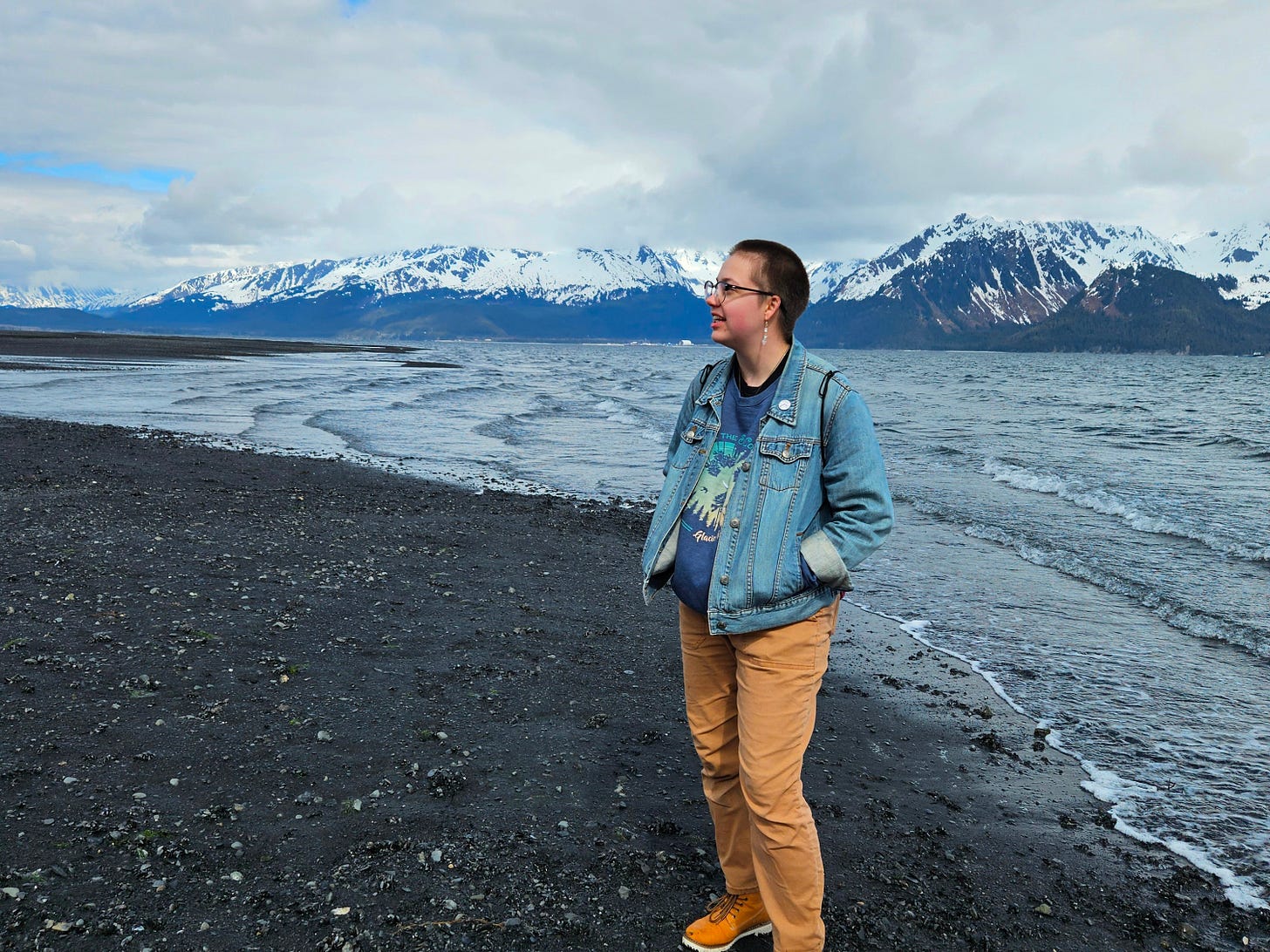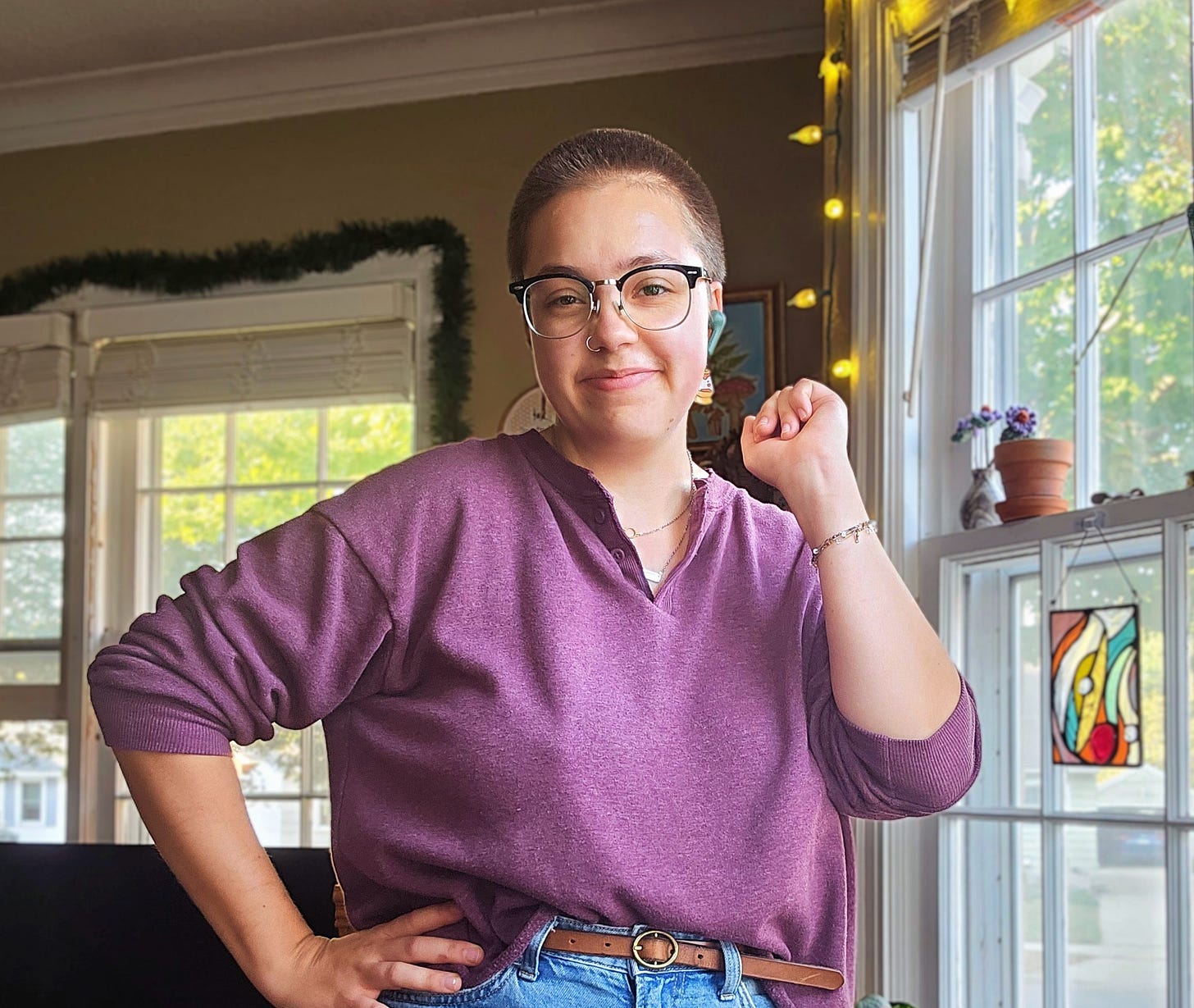It’s Coming Out Day and I prefer to be quiet and *mysterious* about myself because it’s no one’s business, but over a year ago when I started writing this it was super important to me to feel known and understood, so here we are.
I am a human who is less curious about their gender than they are about food systems and root structures in trees, but definitely certainly that as far as sexual preferences and attraction, I would like to excuse myself from the whole thing.
If it’s easier to understand with labels, I’m asexual and aromantic.
Of course there’s more to it than that.
Since I was about 12, I’ve regarded the concept of marriage with a kind of grudging resignation. I suppose that’s going to happen to me eventually, isn’t it?
I had no particular plans for an eventual marriage: the number of kids or pets I might have, where I’d live, required attributes for a future partner, Pinterest board wedding or honeymoon aspirations. It just felt like an inevitability, like losing my baby teeth and getting my period. Matrimony would happen to me and my feelings on it ranged from ambivalent to distressed.
Figuring out I wasn’t a completely straight, heteronormatively oriented person has been and continues to be a protracted process.
Ground zero was the version of me that assumed eventually I’d get married because that’s what happened to all the women I knew or read about or had ever heard of.
Access to single women in my youth was a non-entity. There just weren’t any. All of them were married with kids, married and trying for kids, married, engaged, or single but with a checklist (or prayer list) of what they were looking for in a future partner. 12-year-old me would have defaulted to husband, as there were no queer women in my life at that time either.
In college, I migrated to being a quiet ally of queer folks, learning just enough to be supportive but still pretty certain that I was one of the straights because I had no strong feelings about the opposite gender — although in fact my lack of strong feelings expanded to every gender.
Eventually that dawned on me and then for about a year I was quietly and internally bi-curious. By virtue of a thought experiment, I realized that when I pictured my inevitable future marriage to a lifelong partner, I felt the same about it being a man as I did about it being a woman. Neither more or less excited, but also neither more or less repulsed. Marriage to a woman certainly felt less inevitable to my worldview still deeply ingrained with Christian values, but hey, anything is possible.
While being bi-curious, I continued to flirt with a boy, become best friends with a girl and largely postponed romantic relationships because I was in school and working — two things that were more important to me than dating.
The moments where, looking back it feels like it should have been obvious, are many.
When I broke up with my first boyfriend (who became my boyfriend because I told him I wanted our initially platonic trip to the movies to be a date). We broke up because he wanted to get married someday soon, and I wanted to finish college before any of that nonsense and also because I was tired of having to talk to someone every day.
When I held hands in a movie theater with the boy I had liked on and off for four years, then went home and texted all my friends to say I was over him forever. Not because of anything he did, but because of everything that didn’t happen when we finally went on the closest thing to a date we’d ever done and I realized I didn’t want to do anything more intimate or personal with him than occasionally text and maybe go out for noodles one time.
When my best friend called me to tell me she was engaged and my heart sunk into my chest. And it took me another two years to realize I was sad she was getting married to someone else because I loved her.
When I kissed a girl for the first time and was so physically freaked out by the experience I noped out of my own body between kisses and had a small panic attack about it. Days later I told her it wasn’t her, it was me but I didn’t want to kiss again for a while, much less do anything else. I felt bad, because I knew she liked sex and it was becoming clear that I might never like to have sex. And I felt bad, because it can’t feel good to kiss someone and make them cry about it.
I also felt bad for feeling bad. Why did I have all these feelings about how other people feel about me and in response to me? It’s exhausting managing emotional responses to my emotional responses. Especially when my emotional responses felt so at odds with what I was seeing reflected around me in the lives of my peers and role models.
THEY weren’t having a panic attack about kissing their partners. THEY liked talking to the same person every day. THEY realized they liked someone and didn’t change their mind a month later because the effort to stay in “like” or love-adjacent was too much work.
Somewhere in this quagmire of experience, I encountered the terms “asexual” and then later “aromantic.” These mean slightly different things to different people but to me it works like this:
Imagine sexual attraction and romantic attraction are separate sliding scales of feeling. On the “allo” end of the spectrum are those who experience feelings of sexual or romantic attraction. The other end of the sliding scale (asexual/aromantic) captures those who do not feel those types of attraction. Most folks fall somewhere between those two points, experiencing a degree of attraction (or lack thereof) on both scales, though not necessarily in equal amounts.
I’m pretty much all the way down at the “not feeling” end of the spectrum.
It’s taken me a long time to come to terms with how to think and feel about that.
It is hard to know how to think and feel about myself when the language I have to describe my experiences of fairly ubiquitous yet deeply personal aspects of the human experience (intimacy, connection) is purely that of exclusion. Hard to describe yourself when the only approach is from a starting place of defining all the things you are not.
In the early days, I felt like a hole. A void. A gaping lack. An aberration.
I don’t want to get married, but I don’t want to be alone either. I don’t want to have sex with anyone, but I occasionally got FOMO when it came up because people apparently *loved* it and I’d hate to deprive myself of something good. (I’m still coming to terms with the fact that, while a good thing for some, partnered sex is not a fun, pleasurable experience for me. And that there can be joy in that rather than lack.)
For a long time, being asexual felt like consigning myself to loneliness. Add in aromantic feelings and that dread of future loneliness and isolation quadrupled. Being aro/ace felt true but also painful.
It didn’t help that examples of happy, thriving, content and unpartnered humans in my life didn’t really increase with time. But my friend group did. My communities and connections did. And when a few core relationships abruptly and hurtfully ended and I found myself capable of replacing them and continuing on with joy and purpose, I started to see how I could have a future to look forward, just the way I am.
Talking to a friend of mine who is learning to redefine themselves after transitioning, I finally started to find words to describe how it feels to be aro/ace in a way that starts with joy rather than pain.
I find intimacy everywhere, dipping into a deep pool of friendships and family who I am vulnerable with in many ways. I have heart to hearts like anyone else — not exclusively with a romantic partner, but then again, who among us ONLY talks to their romantic partner about their deepest fears and desires?
I crave connection, to be known, understood, valued, looked up to and celebrated. I crave it from the people and places that are important to me, just everyone else.
I find what I need to be whole all around me. And in that I think I find the real difference. My search for interpersonal fulfillment is not motivated or directed by a lack of a particular kind of partnership that my allo peers are searching for. I can fulfill my human needs with many different types of relationships and be perfectly satisfied and content.
Significant other? No thank you.
Childless cat lady? Queer aunt? Valued community member? Yes please.






